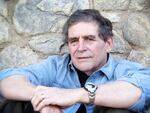
Alan Weisman is author of the new book "Countdown: Our Last Best Hope For A Future On Earth?" The book explores the question, how many people can this planet sustain.
Courtesy of Alan Weisman
Here’s a staggering stat. According to the United Nations the world’s current population of 7.2 billion is projected to increase by 1 billion over the next 12 years. Which would bring us to 9.6 billion by 2050.
How can we sustain all these people on the planet? Or rather, how many people can this planet sustain? That's a question Alan Weisman explored in his latest book "Countdown: Our Last, Best Hope For A Future On Earth?"
I had a chance to speak with Weisman, who will speak tonight in Portland.
Some debunk the focus of Weisman (and others before him including Thomas Robert Malthus and Paul Erlich) on population’s impact on the environment. They instead look at human consumption and energy use. These detractors cite the ‘Green Revolution’ as proof of the triumph of technology over nature. More on that later.
Weisman doesn’t believe that we can ever catch up if we don’t reduce population. Referring to advances in renewable energy like solar and wind power, he says, "We just don’t have mature systems to run all the things in our lives.” And if population grows at its current pace, more people will need more resources.
Alan Weisman In Portland
Powell's City Of Books
7:30 p.m.
1005 W Burnside St. Portland, OR
Weisman's book shares many other facts about just the sheer numbers of people. He also shares some fascinating stories from around the globe that look at the issue from the Middle East to Mexico and South Asia. But perhaps this quote from the book gets at the heart of what Weisman and other see as the biggest reason population growth as one of the most significant impacts on the earth.
“In the next fifty years we will need to produce as much food as has been consumed over our entire human history.”
That’s coming from Hans-Joachim Braun, director of the CIMMYT’s Global Wheat Program. He is one of the successors to Dr. Norman Borlaug, a Nobel Peace Prize winner for his work at CIMMYT developing a bad-ass strain of disease-resistant, high yield wheat.
Borlaug fathered what’s known as the “Green Revolution,” or the period where agricultural technologies and advancements allowed humans to greatly increase food production. A mass famine was averted during this time in India in the 1960s.
The Green Revolution is one of several advancements over the last two centuries that have helped catapult human population into the billions.
But feeding more people means even more impact on the environment. It’s another thing Weisman looks at in him book, how much ecosystem do we need for it all to work? Like all of Weisman's questions there are no easy answers.
Though his book often feels oppressively dire, there is ultimately a hopeful tone. Weisman traveled the globe to observe and document how different cultures and communities are looking at the issue of population. His goal was to find humane answers in some of the places most relevant to this discussion of human over-population. He points to one solution.
“Educate women,” he said. To him that is the single biggest effort that would slow population growth. Educated women, Weisman says, defer their childbearing to a later age when they can economically contribute (rather than caring for children). What’s more, the average female high school graduate has two children, he says.
Weisman feels this is a humane way to change the trajectory. “I’d like us to do it gracefully, rather than let nature do it for us,” he said.
If you have a chance to read Weisman’s book, feel free to share your thoughts below.
-- Toni Tabora-Roberts
